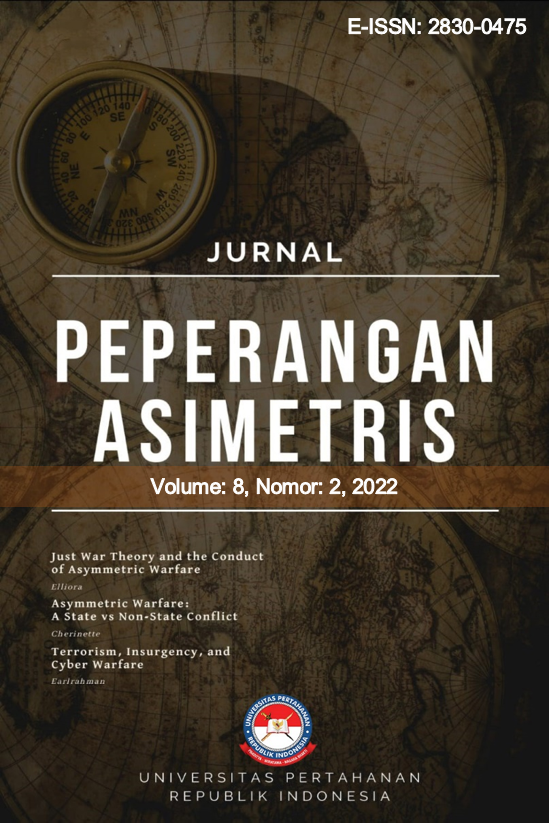LEVELISASI GERAKAN TERORISME, STUDI KOMPARATIF KONTRA TERORISME NEGARA BARAT DENGAN INDONESIA
DOI:
https://doi.org/10.33172/pa.v8i2.1510Abstrak
Ancaman terorisme semakin kompleks. Penanganan ancaman terorisme membutuhkan interoperabilitas institusi pemerintah. Ada hubungan antara pemerataan ancaman terorisme, peraturan perundang-undangan, dan interoperabilitas antar institusi. Peneliti bertujuan untuk mengidentifikasi leveling teori gerakan dan perbandingan counter-terrorist dalam legislasi hukum terorisme di beberapa negara. Metode yang digunakan adalah penelitian kualitatif dengan pendekatan studi banding dari data literatur perundang-undangan penanganan terorisme dari beberapa negara rentang tahun 2010-2020. Perundang-undangan terorisme di Indonesia meliputi UU No. 5 Tahun 2018, UU No. 34 Tahun 2004, dan UU No. 2 Tahun 2002. Saat ini peraturan perundang-undangan masih perlu memuat penetapan leveling ancaman. Aturan tersebut belum menjelaskan proporsionalitas institusi pelibat dan belum memiliki kesiapan bertindak untuk penanganan terorisme secara komprehensif. Hasil kajian menunjukkan bahwa penyamarataan ancaman terorisme dalam regulasi negara AS dan Inggris telah mewujudkan interoperabilitas pemangku kepentingan dalam penanganan terorisme. Sementara Indonesia menghadapi ancaman dalam segala aspek kehidupan berbangsa dan bernegara, peraturan perundang-undangan harus menentukan leveling ancaman. Perundang-undangan mengatur proporsionalitas keterlibatan lembaga negara. Perundang-undangan mengatur proporsionalitas keterlibatan institusi-negara. Kementerian atau Lembaga siap bertindak sesuai tugas dan fungsinya dengan mempertimbangkan kemampuannya dalam setiap tahapan tingkatan ancaman.
Referensi
Bruce, Gregor. 2013. Definition of Terrorism Social and Political Effects
Bruce Hoffman.2006. Inside Terrorism. New York, Columbia University Press.
Coccia, M., Benati, I. (2018). Comparative Studies. In: Farazmand, A. (eds) Global Encyclopedia of Public Administration, Public Policy, and Governance. Springer, Cham. https://doi.org/10.1007/978-3-319-31816-5_1197-1
Corner, E., Gill, P. Psychological Distress, Terrorist Involvement and Disengagement from Terrorism: A Sequence Analysis Approach. J Quant Criminol 36, 499–526. (2020). https://doi.org/10.1007/s10940-019-09420-1
Institute for Economics & Peace. Global Terrorism Index 2022: Measuring the Impact of Terrorism, Sydney.
Keputusan Menteri Koordinator Bidang Politik, Hukum dan Keamanan RI No. Kep/11/2/2004 tentang Pedoman Operasi Terpadu dalam Penanganan Aksi Terorisme, yang dikeluarkan Desk Koordinasi Pemberantasan Terorisme (DKPT) Kementerian Koordinator Bidang Politik, Hukum dan Keamanan RI, tahun 2006.
US Department of Defense (DOD).2019. DOD Terrorism Threat Levels.New York. Curtis E Lemay Center.
Her Majesty’s Government (HMG). (2018). The United Kingdom’s Strategy for Countering Terrorism. In 2015 International Siberian Conference on Control and Communications, SIBCON 2015 - Proceedings (Issue June).
Unduhan
Diterbitkan
Cara Mengutip
Terbitan
Bagian
Lisensi
Proposed Policy for Journals That Offer Open Access. Authors who publish with this journal agree to the following terms:
- Authors retain copyright and grant the journal right of first publication with the work simultaneously licensed under a Creative Commons Attribution License that allows others to share the work with an acknowledgment of the work's authorship and initial publication in this journal.
- Authors are able to enter into separate, additional contractual arrangements for the non-exclusive distribution of the journal's published version of the work (e.g., post it to an institutional repository or publish it in a book), with an acknowledgment of its initial publication in this journal.
- Authors are permitted and encouraged to post their work online (e.g., in institutional repositories or on their website) prior to and during the submission process, as it can lead to productive exchanges, as well as earlier and greater citation of published work (See The Effect of Open Access).
Proposed Policy for Journals That Offer Delayed Open Access. Authors who publish with this journal agree to the following terms:
- Authors retain copyright and grant the journal right of first publication, with the work [SPECIFY PERIOD OF TIME] after publication simultaneously licensed under a Creative Commons Attribution License that allows others to share the work with an acknowledgment of the work's authorship and initial publication in this journal.
- Authors are able to enter into separate, additional contractual arrangements for the non-exclusive distribution of the journal's published version of the work (e.g., post it to an institutional repository or publish it in a book), with an acknowledgment of its initial publication in this journal.

